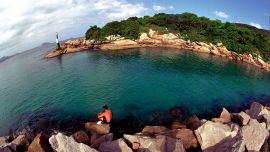While the post-electoral turmoil in Venezuela overshadowed any domestic agenda, this editorial will also view the week’s one clear decision – the choice of Río Negro over Buenos Aires Province as the location of the plant to convert Vaca Muerta shale into liquefied natural gas, a gigantic investment implying the inlay of some US$30 billion.
Not that this defines the future either, far less in the immediate term, but it is more clear-cut than the chaotic scenarios of Venezuela. Total uncertainty as to the future but also the past week – what went wrong after all the optimism over the inevitability of a long overdue transition with only its terms to be negotiated? The simplest explanation would be that a sophisticated political analysis underestimated just how crudely primitive Venezuelan President Nicolás Maduro is, resorting to the most flagrant fraud like a cornered animal. But the analysis could also be overestimating how much in charge of his country Maduro is – he might have been resigned to accepting the logic of events provided that he could ensure his personal impunity but the military beneficiaries of Bolivarian kleptocracy would not allow him.
Other than the sheer unpredictability, another reason making speculation about Venezuela from the other end of the subcontinent futile is that this country has far less to say than Brazil, now the custodian of Argentine diplomatic interests. This in turn reflects the zero communication between Maduro and President Javier Milei whereas Brazilian President Luiz Inácio Lula da Silva, who constantly aspires to regional leadership, is a significant voice. Yet Lula is trapped in an uncomfortable position complicating a decisive intervention – naturally averse to rubberstamping blatant fraud as a democratic leader but compromised by membership in BRICS (Brazil, Russia, India, China and South Africa), given Sino-Russian enthusiasm for its Venezuelan bridgehead in South America, leading him to blurt that last Sunday’s travesty was a “normal process.”
Will that enthusiasm suffice to ensure the survival of a regime totally lacking legitimacy and recognition elsewhere? Before expressing any optimism on that score, look at Cuba.
While the Milei government and its moderate opposition have roundly repudiated Venezuela’s fraudulent presidential vote as against the far left and the fashionably progressive lining up behind Maduro, mainstream Kirchnerism has fallen into a stony silence but only two days after Maduro’s self-proclaimed re-election it was obliged to digest a domestic setback centred on its main hope for the next presidential elections, Buenos Aires Province Governor Axel Kicillof – the loss of the Petronas liquefaction plant to Río Negro despite the infrastructure already installed in the major port of Bahía Blanca.
Perhaps the dice were already loaded against Kicillof, given the libertarian government’s extreme antipathy to Milei’s potential presidential rival as an ardent advocate of the “present state” and also because his flawed 2012 nationalisation of YPF when economy minister threatens to land the state energy company partnering Petronas with the LNG plant at the wrong end of a US$16-billion Manhattan lawsuit, but Kicillof blew all credibility when he tied himself up into verbal knots over the RIGI (Régimen de Incentivo para Grandes Inversiones) investment incentive scheme installed by the government. The governor was in a quandary because he was intransigently against RIGI as an unacceptable concession to big business but he could hardly cost his province US$30 billion after having cost his country US$16 billion. Kicillof’s way of squaring this circle was to continue blasting RIGI at national level while offering it to YPF and Petronas in the form of a provincial bill (which never reached the provincial legislature before last Tuesday’s YPF decision). An incomprehensible contradiction which convinced nobody.
Yet with his reckless insistence on expressing his preference for Río Negro over Buenos Aires Province in political rather than technical terms, Milei does not guarantee the Malaysian investors the security which RIGI aspires to offer them. What assurance is there against Kicillof riding pushback against austerity to win the 2027 presidential elections and relocating the liquefaction plant in Bahía Blanca while tearing up RIGI? It would be far better for the plant’s location to be impartially and apolitically defined according to purely technically criteria, weighing Río Negro’s shorter distance from Vaca Muerta shale, cheaper real estate and deeper waters against Bahía Blanca’s already installed infrastructure.
Yet any significant advance with the plant is even more distant than the 2027 presidential elections, not before 2030 when the global retreat from fossil fuels could be accelerating. Whether in Patagonia or Venezuela, as the old song says, the future is not ours to see.
--TIMES



















Comments